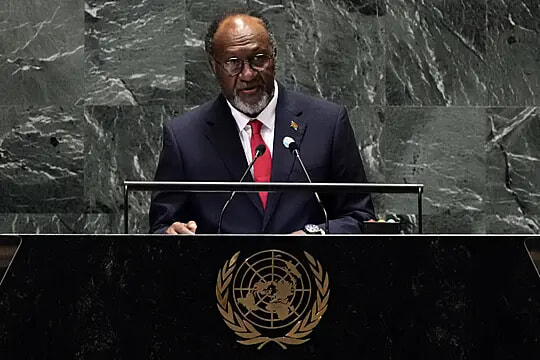
88 Children Removed From Iowa Church Camp & Placed Into Protective Custody
Things aren't always what they seem.
Published June 30, 2025
Advertisement
Advertisement
1. The Raid and Removal

On June 12 and 13, 2025, law enforcement and child welfare officials in Louisa County, Iowa, conducted a sweeping operation at the Shekinah Glory Camp of the Kingdom Ministry of Rehabilitation and Recreation. Authorities responded to urgent reports of child abuse and endangerment, executing search warrants at properties in Columbus Junction and Fredonia. Eighty-eight children, many from out of state, were taken from the camp and placed into protective custody, while the community watched in confusion and concern. The children were transported to a nearby Methodist church in Wapello, where they met with child protection workers and were temporarily housed. Some children were quickly reunited with their parents or guardians, while others were placed in foster care pending further arrangements. Despite the sudden intervention, officials have released few specifics about the allegations or the conditions that triggered the raid. No arrests have been made, and the Louisa County Sheriff's Office has maintained a guarded silence, citing an ongoing investigation. The event stunned the small towns of Columbus Junction and Fredonia, where local populations are tight-knit and news travels fast. Residents expressed both bewilderment and a strong desire to help, offering food and comfort for the displaced children. Meanwhile, the children’s removal reverberated throughout the broader Iowa community, raising urgent questions about safety, oversight, and trust. The raid marked the beginning of an unfolding investigation that would soon draw national attention to this rural pocket of America.
Advertisement
2. The Camp and Its Mission

The Shekinah Glory Camp is operated by the Kingdom Ministry of Rehabilitation and Recreation, a faith-based organization founded in 2018 with deep roots in Iowa’s Chin Burmese refugee community. The camp’s stated mission is to help individuals break free from addiction through religious teachings, provide food and shelter to those in need, and offer spiritual support during fasting and prayer. Every summer, the camp hosts Bible study programs and recreational activities for Christian teenagers, drawing attendees from across the country. Ministry leaders describe their work as a compassionate effort to rescue both adults and children from cycles of addiction and hardship. Boys and girls are housed separately, and organizers say the children are cared for, well-fed, and engaged in activities such as soccer and volleyball. According to the ministry’s website, the Shekinah Glory Camp was scheduled to run from June 8 to 29, and plans were underway to build larger facilities to support more families. Consent forms and guardian authorizations, leaders insist, were collected for all minors in attendance. Family members of the ministry say they were blindsided by the allegations, adamant that the children’s well-being was their foremost concern. A 15-year-old boy from Texas was reported to have placed the initial call for help, a detail cited by both law enforcement and ministry spokespeople. Despite the disruption, leaders maintain their innocence and continue to promote their programs, even as scrutiny intensifies. The camp’s abrupt closure left both organizers and attendees facing an uncertain future.
Advertisement
3. Community Shock and Response

The sudden removal of so many children sent shockwaves through Louisa County, a rural region where such large-scale interventions are virtually unheard of. Local school officials, like Superintendent Mike Peterson of the Wapello School District, quickly mobilized to offer assistance, supplying food and support to the children. Community members expressed confusion and frustration at the lack of details, with many noting the unprecedented scale of the action. Some residents were skeptical about the need for such a dramatic intervention, questioning whether all 88 children were truly at risk. Nevertheless, the town rallied around the children, with offers of food, ice cream, and emotional support pouring in from all sides. “We would provide ice cream, we would provide food, whatever anybody might need. We’re here to help,” said local resident Mark Wehrle. Foster care families stepped in to provide temporary homes for children who could not immediately be reunited with relatives. Throughout the ordeal, the overriding sentiment in the community was a willingness to help, even in the absence of clear information. Despite lingering questions, no one in the community reported hostility or blame directed toward the children or their families. Local churches and schools played a vital role in providing safe havens during the crisis. As the days passed, the focus remained on ensuring the children’s well-being and supporting their transition back to their families.
Advertisement
4. Roots in Refugee Experience

Columbus Junction and its surrounding areas are home to a large population of Chin Burmese refugees who have fled decades of persecution in Myanmar’s Chin State. The Kingdom Ministry and Shekinah Glory Camp emerged in response to the unique needs of this community, offering support where public resources have often fallen short. Many Chin families were first resettled in major U.S. cities before relocating to Iowa in search of work and safety. The Tyson pork plant in Columbus Junction has been a major draw, providing employment and, indirectly, helping to grow the Chin community in the region. By 2013, nearly 500 Chin refugees had made the town their home, establishing businesses, churches, and mutual aid networks. Cultural anthropologists note that when public institutions cannot address mental health, addiction, or poverty, faith-based groups frequently step in. The Chin community is described as deeply resilient, relying on faith, hard work, and strong family ties to navigate the challenges of resettlement. However, experts warn that informal, religious approaches to care can sometimes blur boundaries between support and control. Trauma from past violence, combined with the demands of meatpacking work, can exacerbate mental health struggles and increase vulnerability. Persistent language and cultural barriers continue to limit access to public services, leaving many families reliant on church-based support. The events at the camp highlighted both the strength and fragility of the community’s informal safety net.
Advertisement
5. Allegations and Denials

The investigation that led to the removal of the children began with reports of child abuse and endangerment, but authorities have not publicly detailed the evidence or specific allegations. No arrests have been made, and law enforcement has been careful to withhold information pending further inquiry. Church leaders, including Victor Bawi, have vocally denied any mistreatment of children, insisting that the ministry operates with good intentions and proper consent. Bawi claimed that the call to authorities originated from a teenager who simply wanted to leave the camp, not from any actual danger. He emphasized that the ministry provided for children’s needs, even purchasing expensive clothing for some attendees. Other family members echoed these denials, stating that children at the camp were happy, cared for, and never harmed. During the removal, some children reportedly became distressed, with one girl needing medical attention due to the shock. Despite these assurances, law enforcement has continued to pursue leads, including the possibility of human trafficking. Local and state agencies, including the Iowa Department of Health and Human Services and the Division of Criminal Investigation, are now involved in the probe. The ministry’s reputation and future operations hang in the balance as the investigation unfolds. Amid all this, the children’s safety remains the central concern for authorities and families alike.
Advertisement
6. The Broader Childcare Crisis

The events in Iowa unfolded against a backdrop of nationwide anxieties about child welfare, immigration, and public safety. In Los Angeles, the threat of federal immigration raids has disrupted childcare routines, causing attendance at daycare centers to plummet as parents keep children home out of fear. Many childcare workers, themselves immigrants, are now preparing emergency plans in case parents are detained or disappear. Providers have taken measures such as collecting birth certificates, adding security, and refusing entry to anyone without proper warrants. Legal organizations offer "Know Your Rights" training to help childcare workers handle encounters with law enforcement or immigration agents. Staff and parents alike report heightened anxiety, with children expressing fear that their parents might not return for them. Some nannies have begun sleeping at their employers’ homes or avoiding public parks and libraries altogether. Employers are being urged to provide paid leave or safe transport so workers can shelter at home during periods of heightened risk. The uncertainty has strained relationships, eroded trust in public institutions, and left vulnerable children in precarious situations. The crisis has forced childcare providers to balance legal, ethical, and emotional responsibilities under extraordinary stress. This context underscores the complexity of safeguarding children’s well-being in a time of social and political turmoil.
Advertisement
7. Lingering Questions and Gaps

Despite reassurances from officials that all children have been safely reunited with families, the community is left with persistent questions. Authorities have not disclosed the ages of the children, the full scope of the allegations, or whether any charges will be filed. Researchers and local advocates highlight long-standing gaps in mental health care, addiction treatment, and social services in rural and refugee communities. The Chin community in Columbus Junction, though resilient, still faces significant barriers to formal representation in government and access to mainstream resources. Without sufficient local teachers, nurses, or social workers who speak their language, families often turn inward for help. This insularity can leave serious issues, from abuse to educational neglect, hidden from view. Past trauma, language barriers, and economic hardship make it difficult for families to navigate complex public systems. Some progress has been made in other towns through bilingual education and more inclusive community outreach, but these advances remain uneven. Experts warn that “linguistic and cultural isolation” poses a significant challenge when new populations settle in under-resourced areas. The episode in Iowa is a stark reminder that systems must adapt rapidly to support changing populations. As the investigation continues, advocates urge more transparency and collaboration to rebuild community trust.
Advertisement
8. Ongoing Investigation and Media Attention

Since the raid, local and national media have followed the unfolding investigation closely, searching for answers that have so far remained elusive. Journalists have pressed officials for more details, but law enforcement and child protective agencies have declined to elaborate. Community members, meanwhile, are left to speculate about the true nature of the alleged abuse or neglect. In some outlets, the case has been linked to broader discussions about human trafficking, though concrete evidence has yet to surface. The involvement of state and federal agencies has elevated the case’s profile, adding to the pressure on local authorities to act transparently. Advocates worry about the impact of intense media scrutiny on both the children and the accused community members. In interviews, ministry leaders continue to proclaim their innocence and openness to investigation, inviting authorities to examine their operations. Commentators note that faith-based organizations must walk a careful line between providing support and avoiding the appearance—or reality—of coercion. The situation has prompted renewed calls for better oversight of informal childcare and residential programs, especially those serving vulnerable populations. As public curiosity grows, the balance between privacy, justice, and community trust is being tested in real time. The outcome of the investigation may set precedents for how similar cases are handled in the future.
Advertisement
9. The Children at the Center

At the heart of the unfolding story are the 88 children whose lives were abruptly disrupted by the raid. Many came to the camp seeking community, structure, and spiritual guidance, while some were there due to family challenges like addiction. Their sudden removal, interviews, and temporary placement in foster care or shelters were traumatic, even as officials sought to keep them safe. Camp organizers and family members described scenes of distress as children cried and clung to friends and counselors. Authorities report that all children have now been returned to their parents or guardians, though the disruption left lasting questions. Some children reportedly needed medical attention or emotional support during the ordeal. The situation highlights the delicate balance between protecting children from harm and preserving the stability of their lives and relationships. Social workers and educators have stepped in to offer counseling, meals, and other services as the children reintegrate into their families. Community members continue to offer ongoing support to ensure that the children feel welcome and cared for after the upheaval. In the aftermath, advocates are calling for a careful review of both public and private childcare oversight practices. The children’s well-being remains the driving force behind ongoing discussions and decisions.
Advertisement
10. What Comes Next

The removal of 88 children from the Iowa Bible camp has become a flashpoint in the broader conversation about child safety, community care, and cultural adaptation. The investigation continues, with local and state officials promising to leave no stone unturned as they seek the truth behind the allegations. Meanwhile, the Chin community and camp organizers face the challenge of repairing trust and rebuilding their programs in the wake of public scrutiny. Residents, faith leaders, and advocacy groups are urging greater transparency, oversight, and cultural competence in responding to such crises. Across the nation, the episode has raised awareness of the unique vulnerabilities facing refugee and immigrant families in rural America. Community leaders are calling for expanded mental health, addiction, and social services tailored to the needs of linguistically and culturally diverse populations. Policy experts argue that robust, culturally sensitive public institutions must supplement and regulate faith-based and informal support networks. The story remains unfinished, as investigators, advocates, and families work to ensure that the lessons learned lead to lasting improvements. As the summer draws to a close, Iowa’s small towns continue to grapple with the aftermath of a story that has become much larger than themselves. Through it all, the central focus remains the safety, dignity, and futures of the children at the heart of the crisis. The case stands as a call to action for communities everywhere to strengthen their systems of care, accountability, and support.
Advertisement
Advertisement
You May Also Like






